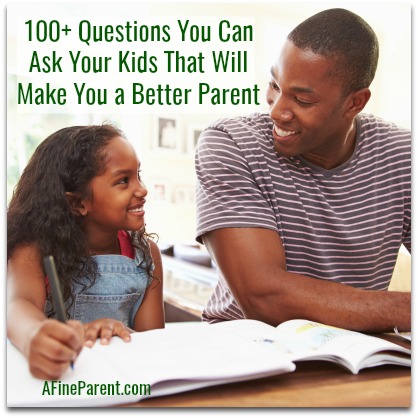 “Mommy! Why can I not open my eyes when I look at the sun?
“Mommy! Why can I not open my eyes when I look at the sun?
Why do I always have to sleep early, when you can stay up late?
Momma, why does the water not flow up the mountain ever?
Doesn’t the moon hate the sun for hiding it in the daytime?
Why is my hair straight and Dad’s curly?
Why can I not fly like the birds?”
Have you also had your share of the endless questions with limited unsatisfactory answers for your little ones? Did you ever think of hiding behind the couch like me seeing your little one in a questioning mode?
It’s payback time! But don’t worry! I’ll make sure it is fun for everyone!
It’s your turn to put some interesting questions to your kids. Because when you put a thoughtful question to your child, it zaps on her thinking mode automatically. And when young minds think, analyze or introspect, they learn best and grow up to be resourceful adults who can think out of the box and survive in any situation.
These questions also build connection between you and your child. They see you actually listening to what they have to say, and they know that they matter to you. You, in turn, get to learn more about what is going on inside their heads and in their lives.
Here are 100 questions which you can ask your kids and enjoy their wittiness, thoughtfulness, and the strength of their character as they answer them. Observe and study their answers carefully as they are going to reveal a great deal about your little bundles as they struggle to answer you or open up greater communication channels for you.
I’ve divided them up into categories that will allow you to focus on having them think critically about several areas of their development.
Here we go-
Getting to Know Them Better
 The questions are simple and oft asked, but their answers are going to surprise you! It’s a simple exercise to see if they can make choices and stick with them. Even you littlest one isn’t so little in their head. You’ll probably love their indecisiveness and their reasons to put someone on their list or to take them off.
The questions are simple and oft asked, but their answers are going to surprise you! It’s a simple exercise to see if they can make choices and stick with them. Even you littlest one isn’t so little in their head. You’ll probably love their indecisiveness and their reasons to put someone on their list or to take them off.
- If you could bring one of the objects to life, what would that be and why?
- Your favorite time of the day?
- Who would you want as your imaginary best friend- could be anyone? (Be ready for anyone from Captain America to Iron Man to Ariana!)
- If you could have one of your friends as your brother or sister, who would it be?
- What is the one food you like most? (Be ready to get all fancy answers as they struggle to let their imaginations run wild.)
- Who’s your favorite friend?
- Who’s your favorite teacher?
- Your favorite sandwich topping?
- A cartoon character you love the most?
- A vacation you would want to repeat again and why?
- All-time favorite movie?
- One book you’ve enjoyed reading the most?
- Which vegetable would you want to make disappear from the face of the earth?
- What cheers you up when you’re really low?
–And this list could go on!
Answering such questions would help them make their choices, mostly between equally loved things and it’s highly likely they won’t be able to decide on any one thing. The choices may change wildly from day to day and week to week, and – as in my child’s case – depending on her mood.
But nonetheless, it does give me a fair idea of her present state of mind. So, keep shooting these questions from time to time and find reasons for the change in the favorites. If the shifts seem normal and part of growing up, breathe easy! If not, look for reasons why they are unable to decide and stick to their own choices.
They are a great way to connect and peak into your little one’s mind but remember – the key is to keep them fun!
Boosting Social Skills
 These questions build on the simpler questions from above and take them to the next level. They are amazing conversation starters… instead of shooting them in rapid fire, look to ask just one or two and let the conversations and discussions build into something a lot deeper and more insightful – for both of you!
These questions build on the simpler questions from above and take them to the next level. They are amazing conversation starters… instead of shooting them in rapid fire, look to ask just one or two and let the conversations and discussions build into something a lot deeper and more insightful – for both of you!
- What do you like doing with me the most?
- Which personality/character trait has gotten you into the most trouble?
- What if your friend told you a secret not to be shared, but you feel it needs to be?
- If you were to have a robot as a friend, which friend would you substitute him with?
- Do you like being alone or with lots of people?
- With whom would you share all your toys?
- The one thing that all your friends like about you?
- What is your favorite mode of communication: a heart-to-heart talk, a text message or a voice note?
- If you were to write a book, what would it be the topic?
- Which is the one thing you’d like to try all by yourself, which Mom doesn’t let you?
- Which teacher would you like to substitute for at school?
- What one activity at school do you hate doing?
- What’s one chore you hate doing at home?
- What movie do you wish you could act in?
- If you were to swap places with a friend, who would that be and why?
- 5 Things you love about your school?
- Which of your friends (according to you) does your Mom like the most?
- What do you think you should do to make your bad day improve?
- Which fictional character would you want to meet?
- How excited are you about your future?
- Do you want to grow up fast or slow it down? Why?
- One dream that you have and how you would work towards living it?
- The things you don’t like in our family.
- What is the craziest thing you’ve ever done, or you wish to do?
- What does home mean to you?
Building Core Values
 The answers to all these questions would actually help you know the thought process of your little one. Just make sure your questions pop at unsuspecting times and be smart enough to hold your response for another time.
The answers to all these questions would actually help you know the thought process of your little one. Just make sure your questions pop at unsuspecting times and be smart enough to hold your response for another time.
This will help to maintain an honest dialogue in the future. The first time I asked my daughter about the pranks she would love to play with her friends, her answers were more unabashed. The next time they were more guarded and controlled.
Maybe you could work your responses into a story, or work on that later.
- If you could help someone or a group, who would it be?
- If you could teach your Mommy and Daddy something, what would that be?
- How do you wish to care for people you know and for those you don’t know?
- What is it that you’d enjoy sharing with others?
- If you could help the earth heal better, how would you do that?
- What is it that you like most in old people?
- What word would you coin or use in place of a cuss word?
- Have you ever wished that you could have what your friends do? If yes, what is it?
- What do you want to thank God or the universe for?
- If you won a hundred dollars, what would you buy with it?
- Your friend is feeling really low and so are you. Would you cheer her up or cry with her?
- A classmate is trying to pull off a naughty and scary prank on a friend. Would you talk her out of it, or would you join in the fun?
Boosting Resilience
 Failure has become so unacceptable that we have managed to raise an army of frustrated kids. Kids who do not learn to tolerate failure are highly vulnerable to anxiety. It leads to meltdowns when the inevitable failure does occur, whether it happens in preschool or college. And the worst happens when they give up trying.
Failure has become so unacceptable that we have managed to raise an army of frustrated kids. Kids who do not learn to tolerate failure are highly vulnerable to anxiety. It leads to meltdowns when the inevitable failure does occur, whether it happens in preschool or college. And the worst happens when they give up trying.
Michael Jordan, the world-famous athlete has spoken extensively about how perseverance and resilience in the face of challenges on and off the court have made him a winner. He has spent years advocating the importance of losing.
Dr. Amanda Mintzer, a clinical psychologist at the Child Mind Institute stresses on why imperfections are necessary and how to tolerate them. She says, “The ability to tolerate imperfection—that something is not going exactly your way—is often times more important to learn than whatever the content subject is.”
- Does counting to 10 help when you’re angry or do you need 90 more counts?
- What would you do if “your dog ate your project” on the day of its submission?
- What do you do to avoid a situation which is likely to get aggressive?
- What efforts do you make to not discuss things which you are sure will hurt one of your friends?
- How do you think the waitress must be feeling when Mr. X shouted at her?
- What would you do if this doesn’t pull off? What’s your Plan B?
- How do you react when you get bad grades despite putting in your best effort?
- Your reaction on coming second in a race by a fraction of a second.
- What if your favorite toy is broken into pieces by your younger brother?
- How would you feel on missing the first half of the movie because Daddy got back late from the office?
- Despite making your best effort, your teacher scolds you for not submitting a good project. How would you feel?
- If no one liked your ideas in a group discussion, how would you react?
I made mental notes of some of her answers so that, at a later time, I could check back in with her on them. I also made plans to help her improve in some of the areas of resilience where she was a bit low.
Developing Critical Thinking and Analysis
 Young children who are 2 to 7 years of age are not mentally equipped for complete critical thinking. They learn through imaginative play and language and find it difficult to truly understand the standpoint of others. Critical thinking questions for them should focus on comparisons and reasoning. “What If,” “How,” and “Why” questions help open up their minds to the thinking process. As they get older you can ask them more involved questions. Here is a sampling of few questions to pick from:
Young children who are 2 to 7 years of age are not mentally equipped for complete critical thinking. They learn through imaginative play and language and find it difficult to truly understand the standpoint of others. Critical thinking questions for them should focus on comparisons and reasoning. “What If,” “How,” and “Why” questions help open up their minds to the thinking process. As they get older you can ask them more involved questions. Here is a sampling of few questions to pick from:
- What is the one thing you’d like to invent which would make life easier for you?
- What is the one superpower the superheroes are missing out on? And if you got it, how would you use it?
- What if our world suddenly comes under an alien attack?
- What if suddenly all gadgets, smart phones, video games and tablets disappear?
- Do you think Batman has only one pair of clothes? He seems to wear them always!
- What do you think about what was said on the news tonight?
- Why do adults make rules that they sometimes don’t follow?
- If you had more than 24 hours in a day and others did not, how would things work out for you?
- What’s the most difficult part about growing up?
- What is one activity you would want to try out?
- What would you want to be famous for?
- How would you describe yourself in five words?
- If you were given the power to solve one problem, which one would it be?
Emotional Endurance
 Psychologist Giuliett Moran of ‘Empowering Parents’ says it’s important to be specific when asking kids about their emotions. We all know importance of open-ended questions. Moran stresses that asking questions that address feelings or emotions can help kids learn how to manage them.
Psychologist Giuliett Moran of ‘Empowering Parents’ says it’s important to be specific when asking kids about their emotions. We all know importance of open-ended questions. Moran stresses that asking questions that address feelings or emotions can help kids learn how to manage them.
“Children need to be able to identify, label and communicate their feelings,” she says. “It’s important to make discussing feelings part of your everyday routine. This will help build social and emotional intelligence in your child – both life skills that set children up for success.”
- What is the one thing that keeps you going even when you want to give up?
- How fortunate do you think you are and in what ways?
- When you disagree with your friends, how do you show it?
- How would you interact with someone who’s slightly different from you- say physically or mentally?
- What do you worry about the most?
- How many times have you felt jealous of your friends and why?
- If you could go back in time and change three wrong things you did, what would they be?
- Have you ever felt that you should have spoken up instead of keeping quiet?
- Do you feel that a particular situation would’ve been better if you had maintained silence?
- When do you think you made a wrong choice?
- Do you think you are short tempered and fly off your handle too often, or are you very patient and take a long time to get angry?
- Do you remember an incident when you demonstrated great patience and were rewarded for it?
- Have you ever lied because you were afraid of the consequences?
- Tell me one achievement which you actually nailed after repeated attempts.
Improving Bonding
 If you are tired of answers in monosyllables, and I’m sure parents of most boys would nod all the way in agreement, you need some great questions that’ll help your kids open up more to you.
If you are tired of answers in monosyllables, and I’m sure parents of most boys would nod all the way in agreement, you need some great questions that’ll help your kids open up more to you.
Vickie Falcone, author of Buddha Never Raised Kids and Jesus Didn’t Drive Carpool suggests a feeling of ‘connectedness’ is the most important factor in a child’s ultimate success and happiness. Her concept of PHIL ‘EM UP is a great one. It says in order to build strong relationships with our children, we need to give them choices and control over a few things (so they can feel POWERFUL), acknowledge their feelings (so they can feel HEARD), ask their opinions (so they can feel IMPORTANT) and show them unconditional love (so they can feel LOVED).
- Why do you think some kids disobey their parents?
- What makes you feel special?
- What is the one rule you would want to change at home?
- What is your favorite family tradition?
- What do you like most about your sisters/brothers?
- If you’d exchange your place with Daddy/Mummy for a day, what would you do?
- What is the best thing that happened to you in the past week?
- What’s the toughest part about being a kid?
- What are your favorite memories?
- What is something you thought you’d never tell anyone but somehow it slipped out?
- Describe how you’re feeling in a different word than you usually do.
- How would you react if you found out that your younger sibling has his hands in all the wrong things?
- One question you would ask someone to make sure he/she can be trusted with a secret?
- Would you ever put down your feelings in a diary? Also, would you read someone else’s diary if you stumbled upon it?
- Who do you find most difficult to communicate with among family and friends?
Whew! That was a long list with so many questions!
But I’m pretty sure the answers will be worth it all. Each answer will be a window to your child’s mindset, the core values he has imbibed till now and his strengths and weaknesses. Do not miss out on the cues he/she drops and keep improving to become the best parent you can for your child.
A word of caution: The questions rebound too. Once your little one bares it all to you, he’d expect you to answer them honestly as well. So, get ready to face the rapid fire!!
2-Minute Action Plan for Fine Parents
For our quick contemplation exercise today, try this:
- Think of 2 questions you can ask today.
- What are some of the best times for your family when you can bring up these questions?
- How would you answer these questions?
The Long-Term Action Plan for Fine Parents
Now for our long-term action plan, think how can you commit to being curious in the long run?
What can you do to make these open-ended questions an essential part of your parenting toolkit?
I really want to be better parent but sometimes I not have enough strength to do anything with my kids. Sometimes they tire me so much, and they break my nerves, even though they are pretty good and obedient children.
Since my wife works all day and I spend all my time with them, my nerves are thinner. And I do not want to be like this, I want to be a better parent to my children
Dear Glb
The fact that you wish to be a better parent makes you one. We all are stressed for time and energy and before we’ll know our little ones will grow up leaving us wondering how time went by. So the key is to enjoy their childhood and our parenting in the little moments that we share, and that’s just how I manage to. Small conversations, with interesting questions can really take our understanding to different levels. And of course, stay tuned here for weekly dose of parental support and guidance.
This is such a great thought provoking article and questions. I love how you have categorized each section with the explination and relevant questions. Like others I would love a printable page for the fridge.
Glad you like the list Genevieve! Have forwarded your request for a printable page..
I love these open-ended questions; I’ll love to use them at home with my teens and in my work place. I’ll write each of these questions in colored-wooden sticks and keep them in a glass jar or pretty bucket on top of my desk the kid can pick up a stick with a random question each time as a nice way to start up a conversation with valuable answers. Thank you
Great idea Karina! I’m pretty sure this’ll make the conversations looked forward to much more eagerly by each one of you.
This list is amazing! Can we have this on a printable page?
Thank you!
Thank you Layal!
Will try and have it in a printable format as there is a growing demand for it 🙂
+
More than the questions, I’m sure you’ll find the answers more interesting and fun Julia. Enjoy them!
This was so great.. like the idea of it printable too so I can stick it on the fridge. I just realised I ask my daughter really boring questions! Mostly like “how was your day”Will be challenging her tomorrow!!
Thanks Ruth!
I would love to have this on a printable page! I love how the categories can help you focus on a specific trait or quality.
loved this wide variety – thanks so much! It’s quite difficult to come up with new questions – this will really help.
Glad you liked it Keren!